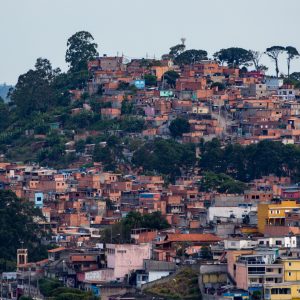Federal Water Tap, January 27: Trump Administration Completes Clean Water Act Revision
The Rundown
Administration diminishes the scope of the Clean Water Act. The Supreme Court says that a lawsuit against local and state officials related to lead contamination in Flint can proceed. The EPA requires industrial facilities to report emissions of 160 PFAS chemicals. A Senate bill would place a moratorium on new concentrated animal feeding operations. The GAO finds “limited information” on the use of alternative drinking water treatment systems for small communities. And lastly, Congress holds a hearing on wildfires and their effect on the power sector and environment.
“We have to do something about other continents. We have to do something about other countries. When we’re clean and beautiful and everything is good, but you have another continent where the fumes are rising at levels that you can’t believe. I mean, I think Greta ought to focus on those places.” — President Donald Trump, speaking in Davos, Switzerland during the World Economic Forum meeting. Trump was responding to a question about whether he thinks climate change is a hoax. “Greta” refers to Greta Thunberg, the Swedish environmental activist.
In context: Water Crises Again Ranked a Top Global Risk in World Economic Forum Report
By the Numbers
160: Number of PFAS chemicals added to the Toxics Release Inventory, the federal government’s system for industrial facilities to report hazardous emissions to air, land, and water. Adding PFAS to the inventory was required as part of a law that Congress passed last year. TRI reports for 2020 are due in July 2021. (U.S. Environmental Protection Agency)
News Briefs
Clean Water Act Undo
The Trump administration finalized a rule that will reduce protections for streams and wetlands. The rule decreases the number of water bodies that are covered by the Clean Water Act, the federal government’s main statute for preventing water pollution.
The administration’s stated aim was to clarify the scope of the Clean Water Act. The Navigable Waters Protection Rule establishes four categories of water bodies that are protected: navigable waters like the Mississippi River, tributaries that flow year-round or part of the year in a “typical” year, wetlands that are adjacent to protected waters, and certain lakes and ponds.
What’s not included: groundwater, farm ditches, isolated wetlands, stormwater control structures, and ephemeral streams. States can still exercise authority over those waters if they so choose.
The biggest effect will be felt in the western states, where many ephemeral streams flow only following rainfall or snowmelt and are an important part of desert ecosystems.
Administration officials dispute the assertion that the rule decreases protections. They say that hydrographic maps from the U.S. Geological Survey do not provide an accurate basis for comparing water bodies covered under the old rule and excluded in the new one.
The rule change fulfills a campaign promise for President Trump, who said he would repeal the Obama administration’s definition of the scope of the Clean Water Act and replace it with something less expansive. The Obama-era definition was repealed last fall.
Trump framed the announcement of the new rule as benefiting farmers, who had complained most loudly that previous requirements limited use of their land. But weakening the law will also benefit developers, mining companies, home builders, and oil and gas firms, which will have fewer restrictions on their operations.
Flint Lawsuits Can Proceed
The U.S. Supreme Court is allowing citizen lawsuits against local and state officials for personal damages stemming from the Flint water crisis to move forward.
The high court denied a petition from local officials to have the lawsuits thrown out. When Flint switched water sources, an action that precipitated the lead crisis, the city was under the leadership of state-appointed managers. The officials had argued that these circumstances provided legal immunity for their actions. By denying the petition, the high court disagreed.
Booker Aims for CAFO Limits
A bill introduced by Sen. Cory Booker (D-NJ) seeks to place a moratorium on large feedlots, called CAFOs
The Farm System Reform Act would prohibit the expansion of an existing CAFO or creation of a new one. A CAFO is defined as holding more than 700 mature dairy cows, 1,000 cattle, 2,500 swine that weigh more than 55 pounds, and 55,000 turkeys. There are also standards for sheep, horses, chickens, ducks, and small swine.
Studies and Reports
Water Treatment for Small Communities
A government auditor found “limited information” on the use of alternative drinking water treatment systems for small communities.
Alternative, in this case, means treatment options besides those commonly used in a centralized facility. Microfiltration membranes, for one. Also: filters installed under the kitchen sink at individual homes and filters installed where water enters the home.
The Government Accountability Office reviewed information from federal databases and academic studies. Reviewers looked at instances of alternative systems used by communities of fewer than 500 people.
The data sets were inadequate for the GAO to draw conclusions about how common alternative systems are and what cost savings there might be. Cost considerations will have to be examined case by case, the report states.
On the Radar
Congressional Hearings
- On January 28, the House Committee on Energy and Commerce will discuss wildfires and their impacts on the power sector and environment. Invited witnesses include the CEO of Pacific Gas and Electric and academic forestry researchers. A background briefing is available.
- On January 29, the House Ways and Means Committee looks at infrastructure financing.
Environmental Finance Meeting
The board that advises the EPA on financing environmental improvements will meet on February 11 to 13, in Washington, D.C.
The board will discuss a report on stormwater infrastructure financing. Registration is open to the public.
Federal Water Tap is a weekly digest spotting trends in U.S. government water policy. To get more water news, follow Circle of Blue on Twitter and sign up for our newsletter.
Brett writes about agriculture, energy, infrastructure, and the politics and economics of water in the United States. He also writes the Federal Water Tap, Circle of Blue’s weekly digest of U.S. government water news. He is the winner of two Society of Environmental Journalists reporting awards, one of the top honors in American environmental journalism: first place for explanatory reporting for a series on septic system pollution in the United States(2016) and third place for beat reporting in a small market (2014). He received the Sierra Club’s Distinguished Service Award in 2018. Brett lives in Seattle, where he hikes the mountains and bakes pies. Contact Brett Walton






Leave a Reply
Want to join the discussion?Feel free to contribute!